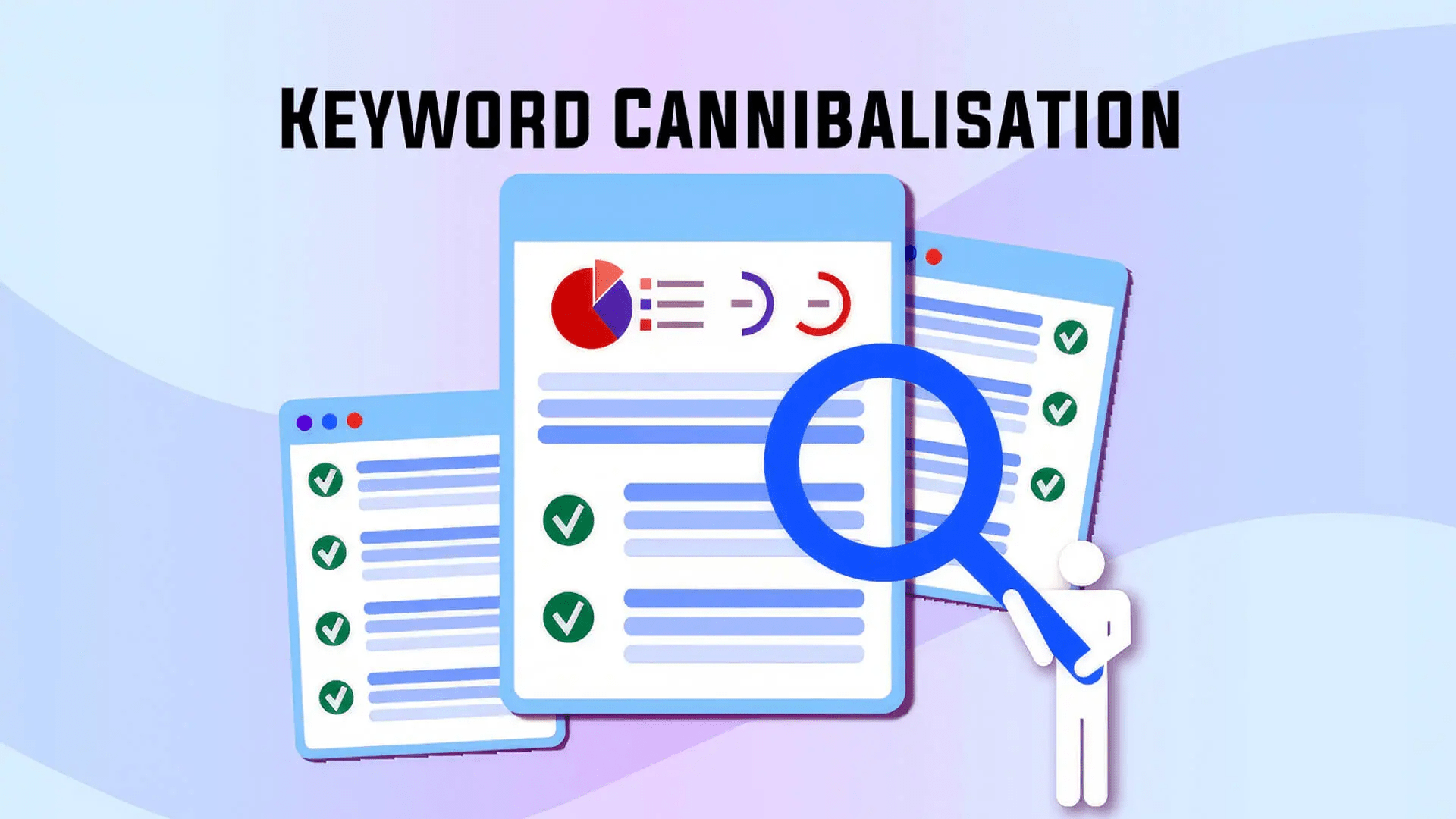For those diving into the world of SEO, keyword cannibalization is an issue that’s easy to overlook but hard to ignore once discovered. When multiple pages target the same keyword, it splits ranking authority and can lead to inconsistent search results. Fixing this problem can make a significant difference in boosting your website’s overall performance.
Let OctopusWriters guide you through the process of identifying, understanding, and fixing keyword cannibalization. Our insights and tips will empower you to enhance your SEO strategy, align each page with specific intent, and improve your chances of ranking consistently in search results.
What Is Keyword Cannibalization?
Keyword cannibalization is a common SEO challenge where multiple pages on a site target the same or very similar keywords, resulting in those pages competing against each other in search results. This competition can prevent each page from reaching its full ranking potential, as Google may struggle to determine which page is most relevant for the search query.

Let’s look at an example. If someone searches “Hotels in Shimla,” Google could return various results depending on user intent. The searcher may be looking for general information on hotels, hotel reviews, or may be ready to book a hotel immediately. For this reason, Google often displays a mix of informational and transactional pages to cover different potential search intents.
For a hotel website, this can create keyword cannibalization if multiple pages are optimized for the same keywords, like “best hotels in Shimla.” If both an informational page and a booking page are competing for similar terms, it can lead to poor rankings for both. This example highlights the importance of strategically optimizing pages to address specific search intents and avoid overlapping keywords.
Why Does Keyword Cannibalization Happen?
We see keyword cannibalization happen for a few key reasons:
- Similar Keywords Across Pages: Having multiple pages optimized for the same or closely related keywords can lead to internal competition. This makes it difficult for any single page to rank well, as they end up dividing ranking potential among themselves.
- Lack of Information Hierarchy: When a site lacks a clear content structure, pages might unintentionally target similar topics or keywords. A well-planned structure allows each page to serve a unique purpose, reducing overlap.
- Over-Focused Optimization: When several pages are intensely optimized for the same keywords, it can signal redundancy to search engines, preventing one clear page from ranking well.
By addressing these areas, OctopusWriters helps ensure that each page supports your SEO strategy without internal competition.
Should You Care About Keyword Cannibalization?
Caring about keyword cannibalization is essential if you’re looking to get the most out of your SEO efforts. Cannibalization occurs when multiple pages on your website target the same keyword, causing search engines to struggle in determining which page is the most relevant. Instead of a clear winner, both pages can end up underperforming, reducing the site’s visibility and authority on that keyword.
Addressing keyword cannibalization helps define the intent of each page. For instance, a product page and a blog article should each have unique keywords and goals. This way, search engines can better understand the purpose of each page, giving you a stronger chance to rank well across various related terms. By consolidating similar pages or differentiating their keywords, you can help one page rank prominently, avoiding the internal competition that cannibalization creates.
Is Keyword Cannibalization Bad?
Keyword cannibalization has the potential to impact SEO, but it only becomes problematic when multiple pages target the same keyword and harm a site’s visibility. Since most pages rank for various keywords, targeting the same term isn’t always a detriment.

For example, two pages optimized for the same keyword may seem to cannibalize each other. Yet, if both pages rank well for other keywords, merging them could mean a drop in rankings. Thus, it’s often better to maintain both if they’re each contributing to overall site traffic.
Why Seo Keyword Cannibalization Is Harmfulis
OctopusWriters presents the five most common consequences of targeting the same keyword on multiple pages. Review each to ensure your SEO strategy stays on track.
Search Engines Get Confused
It is often mistakenly believed that using the same keyword across multiple pages will enhance a site’s ranking potential. With the top search positions driving higher CTRs, it’s understandable why this myth persists. But this approach can work against you by causing self-competition.
When multiple pages are optimized for the same keyword, search engines may struggle to determine which page should rank. Instead of showcasing all related pages, the algorithm tends to favor one, typically based on optimization strength, even if it is not the best match for user intent.
Occasionally, this may result in fluctuating rankings for these pages, making it harder for your key page to maintain a top position consistently.
It Weakens Off-Page Optimization
Quality backlinks are essential for effective SEO, but building them takes time and strategy. You need to choose suitable platforms, verify their authority, and make sure their topics align with yours. Pages with more quality backlinks generally rank higher.
However, keyword cannibalization can reduce backlink effectiveness. If you have two similar pages, each with a few authoritative backlinks, their collective value is usually less than that of a single page with all those backlinks combined.
For example, if a competitor has one optimized page with a stronger backlink profile, search engines are likely to favor it over your divided pages. This means that even with the same number of backlinks, a consolidated link profile can outperform multiple fragmented ones.
Internal Linking Weight Diminishes
Internal links are key to helping users and crawlers find pages quickly while also conveying the significance of specific content. John Mueller of Google has highlighted that internal links go beyond navigation, serving as a direct signal to Google’s algorithms about page relevance.
If multiple pages compete for the same keyword and all are internally linked, search engines may have trouble determining which page deserves the spotlight. In such cases, internal link value is spread too thin, reducing the visibility of any single page. Concentrating links toward one main page can help channel traffic more effectively to a designated pillar page.
Users Behavior Gets Worse
Search engines don’t just examine the words you use; they also interpret your purpose for searching. For instance, if someone types “buy ash wood kitchen cupboard” and multiple pages on your site are optimized for this term, the SERP may end up showing a blog post on measuring kitchen cupboards rather than the relevant product page.

Other scenarios that impact performance include:
- Reduced Click-Through Rate: When users see your page but don’t click, it lowers CTR.
- Higher Bounce Rate: If users click and leave your page quickly, it signals to Google that the content didn’t meet expectations.
OctopusWrites believes that search engines monitor user behavior to evaluate page quality. If your content doesn’t meet user needs, rankings can suffer as a result.
Crawl Budget Gets Wasted
Crawl budget determines both the frequency and scope of crawler visits to your site. If two nearly identical pages target the same keyword, they consume extra crawl budget without added value, which is manageable for small sites but problematic for large ones. Duplicate content can also limit future crawling, risking unindexed pages and lower visibility.
How Does Keyword Cannibalization Impact Your Site Health?
Keyword cannibalization occurs when pages on a site compete for the same keywords, which can dilute authority, destabilize rankings, and reduce key pages’ visibility.
- Examples of keyword cannibalization issues: Cannibalization often arises when similar blog posts or product pages target the same terms. For example, an e-commerce store might have multiple pages for related products, each aiming for the same keyword.
- Google’s Handling of Similar URLs: Google seeks to show the most relevant result for any query. If a domain has multiple URLs targeting the same keyword, Google may split ranking signals or display only one, causing unpredictable SERP behavior.
- Detecting Cannibalized Keywords: Platforms like Google Search Console, Ahrefs, and SEMrush can identify keyword cannibalization. Clearscope’s Content Inventory further helps organize content libraries by various filters, allowing content updates and avoiding unintended overlap.
How To Find Keyword Cannibalization
The real challenge with keyword cannibalization lies in locating pages that focus on the same keywords and cater to the same user intent. When intent is aligned across pages, each page is less likely to attract unique long-tail keywords, so consolidating them usually offers greater SEO benefits.
With OctopusWriters’s insights, here are a few methods for identifying pages that may be creating keyword overlap.
Do A Content Audit
Performing a content audit is a practical approach to detecting keyword cannibalization. During this review, you’ll assess each page’s keyword focus and target user intent, which helps clarify if pages are competing for the same terms. This process is particularly effective for smaller to mid-sized websites, where keyword overlaps are more apparent.
Look At Historic Rankings
Here’s an efficient way to identify keyword competition issues for a specific term:
- Enter your domain in a keyword explorer tool.
- Check the Organic Keywords report and filter by the keyword in question.
- Examine each page’s ranking history for that keyword, focusing on pages that rise and fall alternately.
This method helps pinpoint if multiple pages vie for the same keyword, creating ranking inconsistencies.
Run A Site: Search
If you’re investigating potential overlap on a specific topic within your site, enter the query site:yourwebsite.com “keyword” into Google. This will list each page mentioning the keyword but may include a range of results. Not all results will necessarily compete with your core keywords, so it’s worth reviewing them for relevance.
Run A Google Search And Remove Host Clustering
A site: search on Google can help identify potential keyword overlap on your site, but it has limitations in showing the positioning of each page. This can lead to uncertainties about how to address the overlap properly.

For instance, finding several pages on a similar topic may suggest merging some, yet it’s important to decide which page should stay and which to redirect. Moreover, merging pages doesn’t always guarantee improvement.
Running a regular search with unfiltered results from the same host can show multiple similar pages, offering a better perspective on which actions will be beneficial in tackling cannibalization.
Check For Multiple Ranking Urls
Ranking multiple URLs on your site for the same keyword may indicate cannibalization. Here’s how to find it:
- Enter your website URL into a keyword tracking tool.
- Look at the organic keywords report.
- Apply filters to highlight keywords where multiple URLs are ranked.
It’s essential to check the search results and ranking history for each keyword, as not every overlap indicates a real cannibalization issue.
How To Fix Keyword Cannibalization
Redirects
For pages on your site targeting the same keyword and similar search intent, consolidating them can help strengthen SEO.
Examples of pages to consolidate:
- Multiple posts on a single topic
- Previous versions of landing pages
- Nearly identical FAQ sections
Begin by assessing each page’s SEO potential and selecting the strongest one to keep. Refine it by adding valuable information from other similar pages. Then:
- Publish your new content on the main page.
- Redirect all similar pages to the main URL with 301 redirects.
- Adjust internal links that pointed to old URLs, updating them to the main page.
- Follow Google’s advice by removing redirected URLs from your sitemap.
This method streamlines your SEO, consolidating ranking signals to support your main page in SERPs. Google may take several weeks to fully update, so maintaining redirects for a year is advised to preserve rankings.
Canonical Tags
For pages that are duplicate or nearly duplicate but valuable to users, canonicalization can help consolidate SEO ranking. Examples include:
- PPC landing pages designed for specific campaigns
- Alternate category pathways (such as “/accessories/socks/” vs. “/footwear/socks/”)
- Pages with varied URL parameters (like “?size=10&color=blue”)
Add a canonical tag in the header of each duplicate, directing Google to the main URL: <link rel=”canonical” href=”https://www.website.com/preferred-page/” />
This allows Google to prioritize a single version of the content in search, keeping SEO power focused without losing access to alternate URLs.
Optimize Links And Content
Keyword cannibalization can occur when a more authoritative page on your site overshadows another page that ideally should rank for a specific keyword. For example, if you have a “/laptops/” category page that includes references to gaming laptops and also a dedicated “/laptops/gaming/” subcategory page, Google may rank the broader page higher for the “gaming laptops” keyword. This happens because Google may struggle to identify the most relevant result when pages have overlapping content but differ in SEO strength.
To address this, link from the broader “/laptops/” page directly to the “/laptops/gaming/” page using descriptive anchor text, like “gaming laptops,” which helps direct Google to the right page. Adding similar links from other relevant pages across your site reinforces this structure, making it easier for search engines to prioritize the intended page for that keyword.

For further impact, consider building external links, or backlinks, for the preferred page to increase its rankings. To ensure your page is fully optimized for its target keyword, place the keyword in crucial SEO elements, such as the title tag, URL, H1 tag, and product listings. OctopusWriters’ On-Page SEO Checker, for example, can offer additional optimization ideas based on the top-ranking competitor pages for your target keywords.
Using these techniques helps Google better recognize your preferred page as the ideal result, boosting its visibility and ranking in search results.
Content Creation
Keyword cannibalization can happen when multiple related pages compete for the same keyword, without a single page clearly serving searchers’ needs best.
For example, if you have separate “Oak dining tables” and “Walnut dining tables” pages but both target “wood dining tables,” this overlap can confuse search engines, reducing the ranking potential of both pages.
To resolve this, create a dedicated “Wood dining tables” category page that includes products from both collections. Optimize this new page thoroughly, focusing on “wood dining tables” specifically. Next, “de-optimize” the oak and walnut pages by substituting “wood dining tables” references with more specific terms (like “oak dining tables”) and by adding links back to the main “Wood dining tables” page using that keyword as the anchor text.
These steps should help solve keyword cannibalization over time, providing a clearer path for both search engines and users to find exactly what they’re looking for. This strategy not only boosts search performance but also improves user experience, potentially increasing sales.
Noindex Tags
Using the noindex tag (<meta name=”robots” content=”noindex” />) tells search engines to exclude a page from search results, keeping it hidden. This tactic can prevent keyword cannibalization by removing competing pages from visibility. Since noindex does not pass any SEO value, use it cautiously. It’s most effective on low-SEO pages like thin-content tag pages or pages that generate little to no traffic.
Target Different Search Intents On Each Page
If merging pages isn’t an option, you can refine each page’s content to target unique search intents. Start by assigning a distinct purpose to each page and tailoring its content accordingly. For example, if you have multiple pages ranking for the same keyword, you can shift each to focus on a different search intent:
- Informational: Provide advice or solutions.
- Transactional: Highlight products for those ready to purchase.
- Commercial: Support users in researching options before they buy.
- Navigational: Ensure visibility for branded searches.
Let’s say you own an online shoe store. If several pages compete for “running shoes,” redefine each one with a unique intent like this:
- Informational: Write “How to Choose the Best Running Shoes.”
- Commercial: Create “Top Running Shoes for Flat Feet.”
- Transactional: Develop a category page featuring running shoes.
Make sure to optimize each page with variations of the main keyword to match the specific search intent.
Leverage Google Search Console And Google Analytics For Monitoring
Make it a habit to check Google Search Console and Google Analytics for insights into keyword rankings, CTR, bounce rates, and traffic flow. These metrics highlight keyword cannibalization when several pages compete for the same keyword. Spotting these issues early enables you to strategically redirect, merge, or optimize content, ensuring that your website remains search engine-friendly and user-focused, ultimately strengthening your overall SEO.
Add A Canonical Tag To Prioritize A Page
Duplicate content may appear across pages affected by keyword cannibalization. One solution is to apply canonical tags, which guide search engines to prioritize a specific page for indexing and ranking.
For example, if you have two articles titled “How to Create a GPT” and “How to Make a GPT Quickly,” with overlapping content, adding a canonical tag on one article signals search engines to emphasize it over the other. Although this approach helps direct ranking signals to a preferred page, consider revising the content to differentiate each article and avoid potential duplicate content penalties in the future.
Restructure The Site To Remove Cannibalized Pages
When it comes to managing keyword cannibalization, OctopusWriters typically avoids page deletion due to its impact on link authority and potential for creating broken links. Removing a page loses its accumulated backlinks and the link juice it passes to connected internal pages. For pages no longer adding value, deletion may be a suitable choice; however, for those that are still relevant, we advise setting up 301 redirects. This helps retain link equity while smoothly directing users to pages with related content.
How To Avoid Keyword Cannibalization In The Futurekeyword Cannibalization
To prevent future keyword cannibalization on your site, take proactive measures after resolving any existing issues. Here’s how:
- Regular Audits and Monitoring: Set a routine to audit and monitor your pages for any potential cannibalization. Use tools like Google Analytics and Google Search Console to identify keywords that trigger multiple URLs on your site. This consistent review helps maintain content clarity and prevents any overlap in keyword focus.
- Create Clear Content Strategies with Unique Target Keywords: When developing content, define unique target keywords for each page and ensure content aligns with a specific purpose. By creating separate content strategies for transactional, informational, or navigational keywords, you avoid accidental overlap and make sure each page serves a distinct user intent.
- Update Internal Linking Structure: Internal links should guide users and search engines to your most relevant pages. Adjust any links that might be directing users to similar or competing pages. For example, ensure your blog posts link to related but unique categories, emphasizing your site’s primary pages.
- Use Keyword Clustering for Improved Relevance: Organize keywords into thematic clusters and assign each cluster to a dedicated page. By creating clusters around topics, you ensure that content stays focused and relevant, reducing the chance of pages competing against each other for the same terms.
- Analyze Top-Ranking Competitor Pages: Observe how top-ranking competitors handle similar keywords, intent, and page structure. Doing so can give insights into which keywords to prioritize for your main pages and which to allocate for supporting or sub-pages.
- Leverage Long-Tail Variants and Secondary Keywords: Use long-tail keywords and semantic variations on supporting pages to differentiate them from primary ones. This not only helps capture more specific search intent but also allows each page to serve distinct needs without overlapping with high-priority pages.

Keyword Cannibalization And Online Shops
Online stores with numerous product pages often need to manage keyword overlap among similar items. For best results, consider linking each product page back to a category page, making it clear which page to rank. When older product pages begin to conflict with critical category pages, redirect them to ensure visibility for your main pages. OctopusWriters can help streamline these redirects, supporting better site structure and SEO outcomes.
Keyword Cannibalism Will Affect Growing Websites
As your site grows, the likelihood of facing keyword cannibalization rises. You might naturally create overlapping content on favorite topics, often without noticing. I’ve dealt with this myself. To avoid this, it’s worth regularly reviewing your top keywords. Identify if any pages are unintentionally competing and adjust your site’s organization or rewrite articles to ensure each page ranks effectively.
How Ecommerce Sites Handle Cannibalized Keywords
E-commerce websites can face keyword cannibalization due to similar content across product pages. To mitigate this:
- Ensure unique descriptions for each product to highlight key features that set products apart.
- Set up filtering options for attributes such as color, size, and other details to avoid creating excess, similar pages.
- Optimize main landing and category pages with targeted keywords, using them as focal points for search traffic.
Regularly review pages for overlapping keywords, as focusing on a clear hierarchy in your site structure can also prevent pages from competing against each other in search results.
Lessons From Digital Marketing And Seo Professionals
Gain expert knowledge in digital marketing without any cost. Key advice includes conducting thorough content audits, focusing on targeted keyword optimization, and utilizing analytics tools to address keyword cannibalization. Regularly examining your content, refining keyword usage, and closely monitoring rankings with analytics software will help you build a well-rounded SEO strategy, giving each page a better chance to rank for relevant searches.
When Cannibalization Is Not Problematic
When you create multiple pages with clearly distinct purposes, keyword cannibalization typically won’t affect your organic search performance.
Different Locations
If your site includes multiple pages targeting similar keywords across different locations, ensure each one is distinctly customized for its target audience. Beyond merely mentioning the location, enrich each page with relevant, location-based details such as nearby landmarks, specific regional challenges, or seasonal advice. This helps search engines treat each page as unique content.

For example, a “plumbing services” page for Seattle could include insights on common plumbing issues caused by local weather, while a “plumbing services” page for Phoenix could mention services that cater to the region’s desert climate. Adding unique content like this for each page improves SEO while addressing the needs of different audiences.
Varied Search Intents
Cannibalization won’t generally occur if each page is crafted with a different search intent in mind. You can create multiple pages centered on related topics while making sure each serves a specific purpose. For example, let’s say your website covers SEO strategies. One page could cater to informational search intent, like “SEO basics for beginners,” while another targets a more transactional intent, such as “find affordable SEO services.” By defining and meeting different user needs with each page, you allow search engines to better understand and rank your content without overlap.
What To Look For: Keyword Cannibalization Red Flags
Understanding why keyword cannibalization hinders SEO is essential; now, let’s explore how to identify it on your site. Below are common indicators that multiple pages may be competing for the same keyword.
Url Rankings Constantly Change
A clear sign of keyword cannibalization is when various pages on your site consistently replace each other in search rankings for the same keyword. Ideally, only one URL should be ranking for a particular keyword. When pages switch rankings, it may confuse search engines about which page is the most relevant.
For instance, a blog post optimized for a keyword might rank for a while, then a product page optimized for the same term replaces it. This back-and-forth can dilute the SEO impact of each page and cause search engines to assign a lower relevance to all competing pages.
Ranking Fluctuations
Sudden ranking drops or fluctuations, such as a decline of 5-15 positions, often point to keyword cannibalization issues on your site. Pages competing for the same keyword may lead to unstable search results, where a page occasionally ranks well but often falls back due to mixed signals given to search engines. This lack of optimization can create sporadic SERP appearances that do not align with your page’s target goals.To counter this, consider revising and streamlining keywords for clarity across different pages, so they maintain more reliable positions.

Ranking Queries Don’t Move Up In The Serp
After selecting a target keyword, it’s essential to track your ranking progress over time. If you’re actively optimizing for the keyword but find it isn’t moving up, the issue could be that multiple pages on your site are vying for that same keyword. This internal competition can confuse search engines about which page to prioritize, ultimately stalling your ranking efforts.
In addition, these competing pages may lack sufficient backlinks, a critical SEO factor. When backlinks are scattered across several similar pages, their impact weakens. Unlike a single page with a consolidated backlink profile, multiple pages won’t convey the same authority, diminishing their overall ranking potential.
Focusing your efforts on a single page for the target keyword, backed by strong internal links and relevant backlinks, is a more effective strategy. It improves that page’s authority and SEO potential, helping it climb search rankings and enhancing the site’s overall performance.
The Wrong Url Is Ranking For The Right Keyword
Locate the page currently ranking for your target keyword. If it’s different from the one you optimized, this could be due to overlapping optimization, with both pages targeting the same keyword. This overlap can lead to confusion for search engines, potentially causing the primary page to be replaced in the search results.
What Else Beginners Should Know About Keyword Cannibalization
To better navigate and manage keyword cannibalization, keep these foundational tips in mind:
- Deciphering Search Intent for Better Alignment: Adapt your pages to match user search intent behind their queries, not just SEO keywords. Knowing if they’re after information, products, or guidance allows for better alignment.
- Why Long-Tail Keywords Are Essential: Long-tail keywords help lower competition, improve SEO, and prevent cannibalization. These more specific phrases can direct targeted traffic and boost page ranking.
- Clear Topic and Keyword Management: Avoid stuffing pages with the same keywords by giving each page a focused, unique topic. Use SEO tools to select varied terms to further reduce overlap.
- Integrate Social Media into Your SEO Plan: Use social media strategically to share content that targets diverse keywords, expanding your reach and helping avoid content redundancy.
- Identifying and Fixing Keyword Cannibalization: Watch for ranking drops, fluctuations, and traffic dips as signs of potential cannibalization. Solutions include adjusting keyword usage, content organization, and using content analysis tools for monitoring.
Frequently Asked Questions About Keyword Cannibalization
How To Target Long-Tail Keywords Without Cannibalization?
Here are a few alternative strategies for effectively targeting long-tail keywords without cannibalization risks:
- Assign Unique Long-Tail Keywords: Ensure each page is optimized for a specific, intent-driven long-tail keyword. By isolating the intent of each keyword, you avoid overlap and allow each page to target and rank for its specific search term.
- Build Detailed Hub Pages: Rather than creating multiple pages for closely related topics, consider developing a single, comprehensive hub page. This structure clarifies site organization for search engines and enhances the user experience by providing a complete overview. Before implementing, check SERP results to ensure this structure aligns with user intent.
- Utilize Regular Keyword Research: Routinely research and identify new long-tail keywords to strategically integrate into your content. This approach allows you to diversify topics across your site, minimizing overlap and better matching each page to distinct search queries.
How Does Keyword Cannibalization Differ From Keyword Stuffing?
Keyword cannibalization and keyword stuffing are distinct issues related to how keywords are managed on a website, though they can both impact SEO. Keyword stuffing occurs when a webpage is overloaded with keywords in an effort to manipulate its ranking in search engine results. This practice often degrades user experience and content quality and goes against Google’s quality guidelines, potentially resulting in penalties.

Keyword cannibalization, on the other hand, is when several pages within the same site unintentionally target the same keyword. This can confuse search engines, leading to lower rankings as they struggle to determine which page is most relevant for the query. Unlike keyword stuffing, keyword cannibalization is usually accidental and doesn’t violate Google’s policies, though it can reduce the site’s overall SEO effectiveness.
Which Sites Suffer From Keyword Cannibalization Most Often?
Keyword cannibalization is an issue that can impact many types of sites, but it’s especially common in ecommerce and news platforms. These websites often have multiple pages targeting similar keywords due to overlapping products or recurring topics, which can lead to keyword conflicts and reduce overall page performance.
Cannibalization risks also tend to grow as websites expand. When new content is regularly added without clear coordination, it’s easy for multiple pages to unintentionally compete for the same keywords. A structured keyword strategy can help mitigate this risk and ensure that each page focuses on unique search terms.
How To Avoid Keyword Cannibalization If You Sell Similar Products
Reducing keyword cannibalization among similar products involves several strategies. Begin by crafting unique product descriptions, titles, and details for each product page, making them distinct from other pages on your site. Then, incorporate secondary keywords to differentiate your content. Lastly, create category pages for top-level keywords and optimize them, while ensuring each product page links back to its relevant category page.
How Does Keyword Cannibalization Impact Seo Rankings In 2025?

Here are a few more options explaining the impact of keyword cannibalization on SEO rankings in 2025:
- Keyword Cannibalization Weakens Page Authority: In 2025, keyword cannibalization primarily reduces the authority of individual pages by spreading ranking signals across multiple similar pages. When several pages compete for the same keyword, each page’s SEO potential is diluted. This can prevent any one page from achieving top rankings for a keyword, as search engines may become unclear on which page to prioritize.
- Ranking Instability and Traffic Drops: Cannibalization can lead to fluctuating rankings and reduced organic traffic, especially as search engines increasingly prioritize user intent. Pages with overlapping keywords may compete internally, leading to inconsistent performance on search engine results pages (SERPs). By carefully planning keyword strategies and defining the unique intent of each page, site owners can help stabilize rankings and improve traffic.
- Impact on User Experience and Click-Through Rate (CTR): Keyword cannibalization also affects user experience in 2025, as it can confuse users who encounter similar content across different pages. This issue is especially pronounced when multiple pages appear in search results for a single query, often leading to lower click-through rates for each page. Addressing cannibalization by clearly differentiating content and targeting distinct keywords can significantly improve CTR and user engagement.
- Increased Importance of Structured Content Mapping: In 2025, cannibalization underscores the importance of structured content mapping, where each keyword is carefully assigned to a dedicated page. This approach helps search engines understand which pages offer the most relevant information, leading to stronger performance for target keywords and helping avoid unnecessary competition among pages.
By addressing keyword cannibalization through strategic content mapping, page consolidation, and targeted keywords, websites can improve their chances of ranking consistently and drive more focused organic traffic in 2025.
Conclusion
Tackling keyword cannibalization effectively can transform your SEO approach, creating a clearer, more impactful site structure. By focusing on unique keywords and strategic content organization, you make it easier for search engines and users to understand and engage with your site. OctopusWriters thanks you for diving into this guide with us, and we hope these insights set you on a path toward improved rankings.

